- Home
- Herbert Strang
Palm Tree Island Page 15
Palm Tree Island Read online
Page 15
CHAPTER THE TENTH
OF THE NAMING OF OUR ISLAND--OF A FLEET OF CANOES, AND OF THE MEANSWHEREBY WE PREPARE TO STAND A SIEGE
We had now fairly established ourselves as the owners of the island,having a comfortable house, domestic animals, and a sufficient store offood, the only article in which we were lamentably deficient beingclothes. The necessity we were under of working hard with our handsleft us little time for commiseration, and I verily believe that wewere in the main as cheerful and happy as we could have been anywhere.And now that the completion of our hardest tasks left us a littleleisure, it came into our heads that we ought to give our property aname, or rather it was Billy that thought of it, he saying that since Iwas clearly king of the country, it was ridiculous not to be able tosay what country it was.
"Call it Smoking Island," says he, "because of that old smoker upthere."
To this I objected that it was not a pretty name, and besides, themountain was not always smoking.
"Well then," he said, "call it Lonely Island, because it is lonely, andso are we."
To this I replied that a more cheerful name would suit me better, andsuggested that we should call it Perseverance Island, since all ourpresent comforts sprang from our persevering in the face ofdifficulties. But this Billy would by no means agree to, saying thatit looked like bragging, and besides he hated the word perseverance,because he had to write it so many times on his slate at school, and itmade him think of raps on the knuckles. He told me that he had beenfor a few months at a charity school, but he played truant so oftenthat the master refused to have him any longer, at which he was veryglad. After considering sundry other names, to which either Billy or Ihad some objection, we finally settled on Palm Tree Island, bothbecause most of the trees of the island were palms, and because we gotour first comfort, when we were deserted, from the cocoa-nut palms onthe hill-side.
The general country being thus fitted with a name, we proceeded to namethe several parts of it. The mountain we called simply The Mountain,though to Billy it was always Old Smoker; the slope leading up to thecrater we called Rocky Hill, and the wood beneath Bread-fruit Wood.The big rock at the north-west corner was Red Rock, and the two smallerones at the south-west were The Sentinels. And so we named variousparts as we thought of it, not all at one time, and many of them notuntil I made my map, of which I may say more hereafter. I mustmention, however, that Billy insisted on giving my name to the woodwhere we slept on our first night, and in my turn I gave his name to asandy bay on the west of the island, and Billy was very proud when hespelt out Bobbin's Bay on the aforesaid map.
[Sidenote: Plantations]
So the winter passed away, not like the winter in England, for we hadno frost or snow, nor did the leaves fall from the trees; the only truesign that it was winter was the absence of flowers and fruit on thetrees; and even this was not the case with all of them, for thecocoa-nut palm bore its fruit all the year round, so that on the sametree there were nuts in all stages of ripeness, which I thought a verywonderful thing. We had a considerable amount of rain, and this becamegreater as we came into the spring season. We had kept for this seasonthe yams which we saved from the pigs, as I related a while ago, and wenow planted them, choosing two places, since we did not know on whatsoil they would thrive best, whether where we had found them, or nearour house. We had kept the yams in one of our pans, and we guessed itwas time to plant them because we saw sprouts growing out of them, asyou sometimes see the eyes of a potato sprouting. We cut thesesprouting parts off, keeping the other parts for boiling, and set themin the ground, some on the ground just below our house, the others inthe glade where we had discovered them. Knowing that we stood nochance of getting a crop unless we defended the plants from the wildpigs, we put fences of hurdles (made of twigs and reeds) round ourplantations, which were at first only a few yards square, and waitedwith what patience we might for the result. I will say here that theyams we planted near our house came to nothing, why I know not; but theothers throve exceedingly, and though we had some trouble with thepigs, which broke down the fence more than once and did some damage, wegot a very fair crop in the summer, which supplied us with mashedpotatoes, as Billy said (for which we used dripping from the pigs wecooked), and also with seed for another sowing.
Jug with Bent-wood Handle and Cup]
[Sidenote: Articles of Toilet]
Though our great work in the building of our hut was finished (at leastwe thought it was) our days were by no means idle, for we had ouranimals to feed and our fences to keep in repair, and moreover we mademore pots and pans, also arrows and spears, thread and rope. One thingthat gave me much amusement was the brush that Billy made. Of coursewe had not been able to attend to our toilet since we came to Palm TreeIsland, beyond bathing and washing our heads: I mean we could not brushour hair, which was now grown down to our shoulders for want ofscissors, nor trim our finger-nails, though our hard work kept thesepretty short. But on going down to the lake one sunny day to fetchwater I saw my image reflected, and afterwards bemoaning my exceedingunkempt appearance, though in truth it mattered nothing, Billy took itinto his head to make me, secretly, a brush and comb, which hepresented to me with great glee. "There, old king," says he, for hesometimes called me king instead of master since we named the island,"there you are, and I hope you'll use 'em to keep your old majesty'shead tidy." His manner of addressing me was not, you perceive, veryreverential; but I will say this for Billy, that though he was verysturdy and independent of spirit, he was never insolent, being agentleman in his nature, and so we were rather good comrades thananything else, and the talk of kings and so forth was mere fun andplay-acting. I did use the brush and comb which he had made for me,but not, I confess, very often, and I cannot help thinking what a greatnumber of things that we are accustomed to we could do without; indeed,though we had made ourselves knives and forks, we did not use them verymuch either and you might have seen us at dinner-time squat down on thefloor of our house, with two mats of leaves in front of us, on one ofwhich was our meat (pork, or a pigeon or fowl), on the other our yamsor bread-fruit, boiled or baked, with a little heap of salt in thecorner, and little clay mugs filled with cocoa-nut juice or water atthe side. Then we would take a yam in one hand and a shank of pork, ora leg of fowl, in the other, dip them in the salt and take a bite, andthen a bite of the yam, and so go through our meal very comfortablytill only the bones were left. Afterwards we thought of making stoolsand chairs and a table, as much to employ our time as for anyconveniency of them, and then we ate our meals again in the civilizedway, though I own I thought it not a whit better nor much cleaner thanthe other, for we could always wash our hands.
The Brush Billy made, showing also the manner of it]
Comb of Spines]
I said that we could not cut our hair, but when it grew so long that itcovered our shoulders, and Billy said I should soon be an old woman, wethought of shortening it by burning; so we each became barber in turn,holding the hair away from the head with Billy's comb, and then burningthe ends away with a torch. Billy was much more hairy than I was, andthough he was three years younger than me his cheeks and chin alreadyshowed signs of black whiskers and beard, and one day I found himtrying to shave with a flint, having made soap by boiling fat with theashes of wood; but he succeeded so ill, only making his chin raw, thathe gave it up, and said he supposed he would have to look a fright.
"ONE DAY I FOUND HIM TRYING TO SHAVE WITH A FLINT."]
[Sidenote: A Fleet of Canoes]
One day, about a year after our first coming to the island, as wejudged by the ripeness of the breadfruit, Billy went up Flagstaff Hill,as we called it, to take the survey which we never omitted, each of usdoing it in turn, though we sometimes went together. I was moulding anew pan, when all of a sudden I heard a great shout from the hill-sideabove, and looking up I saw Billy leaping down towards me with a speedthat seemed very dangerous, waving his arms and shouting, though in thedistance I could not distinguish his wor
ds. My heart leapt into mymouth, as the saying is, for from his excitement I surmised that he haddescried a sail at sea, and I thought he was calling to me to help himraise our signal. I ran towards him, and as we drew nearer to eachother, I saw plainly on his face the marks of great agitation, and thenin a breathless way he called the one word "Savages!" and I wasinstantly in a terrible fear lest they had landed on the island andwere coming to attack us.
However, when we met, Billy told me that from the hill-top he had seena fleet of canoes on the north side of the island, passing from west toeast. They were filled with savages, though whether armed or not hecould not tell, they being a good distance out at sea, nor was thereanything to show whether they purposed landing. It came into my mindwith a shock at that moment that we were very ill able to defendourselves in case they should land and attack us, for we had verylittle provision in our hut, and if we took refuge there they mightkeep us shut up until we died of hunger, or thirst, which would beworse. I blamed myself very much for lack of prudence in not makingprovision for such an emergency, but the truth is that after spendingso many months without seeing a human form we had become careless, andwent from day to day as though there had been no human beings in theworld except our two selves. However, it was too late to make up forthis neglect now, if the savages did indeed land, and I saw that inthat case we could only take to the woods and trust that our hut andplantations, being inland, might pass undiscovered. Accordingly Iaccompanied Billy back up the hill, and we went round the wood whereour signal-tree was, to a place nearer the crater, whence we had a moreextensive view.
"There they are!" cried Billy, pointing out to sea, and I saw eight ornine long canoes filled with brown men, who must have numbered near twohundred in all. But I saw with inexpressible relief that they had comepast the Red Rock, and were proceeding steadily eastward, and knowingthat there was no beach on the north side of the island where theymight land, we had great hope that we should not be troubled with them.Keeping out of sight behind rocks, though indeed there was perhapslittle danger of our being seen, we watched the fleet until it becameno more than a speck on the eastern horizon, and then we went down toour hut, relieved of present danger, but by no means easy in mind aboutthe future.
[Sidenote: Fortification]
We knew not whether the fleet was going or returning, but whichever itwas, I was surprised it had not put in at our island for rest andrefreshment, for the nearest land to the west was at least twenty milesaway, and on the east it could not be less, for we had seen but thedimmest line in that direction. Billy said the savages were withoutdoubt afraid of the old smoker, and even though he was harmless atpresent, the island had a bad name, and so they would not land on itexcept under very great stress. This I devoutly hoped was the trueexplanation, for if it was, we had a reasonable hope that we shouldnever have to deal with savage enemies. Yet the fright we had haddetermined us to do something to provide more efficiently for oursafety, and the first thing we did was to make loopholes in the wallsof our hut, so that if we were at any time forced to take refuge there,we might at least be able to make some resistance by shooting arrows atthe enemy. Then we carried a great number of cocoa-nuts into thehouse, which would provide us both with meat and drink, and wedetermined to dig a hole in the floor when the bread-fruit was fullyripe, and store it with the pounded pulp as we had done outside. Thenit came into my head of a sudden that, our hut being built wholly oflogs and thatch, the enemy might easily set fire to it and burn usalive, and to hinder this we carried down great quantities of theclayey soil of which we made our pottery ware, and mixing it with sandand small stones, we made a kind of rough-cast with which we coveredthe whole of the outside of the hut, roof and all, so that we not onlyconcealed the joints of the walls, but also, as I hoped, protected thehut from fire.
This work took us a long time, as you may guess, and before we hadfinished it, we saw the fleet again. One or other of us went up thehill several times a day to watch the eastern horizon, and on the thirdday, I think it was, after we first saw the canoes, a little aftersunrise, I saw some tiny specks in the east, and recognizing them byand by for canoes I watched them with great anxiety. I feared lest wemight have two enemies to deal with, the savages and the volcano, whichhad been rumbling for a day or two at intervals, and sending up puffsof steam or smoke, and we wondered whether there was going to beanother eruption like that at the time of our first coming. As soon asI saw the canoes, I signalled for Billy to join me, and the moment wecaught sight of them he cried: "Why, there's only six; there was eightor nine before," a fact which had escaped my notice. They were plainlyheading straight for the island, and not in a course that would bringthem past the north side with a good offing as before.
"I don't want to be eat," said Billy, going pale under his sun-tan;"but we can't fight over a hundred savages, can we, master?"
Before I could reply there was a loud rumbling beneath us, and beingnot a great way from the crater, we set off at a run, going downtowards the Red Rock, there being no lava on this side. We had runbarely twenty yards when a great puff of steam or smoke was shot upinto the air for near two hundred feet, I should guess, and a shower ofpumice stones fell around us. This frightened us so much that,forgetting all about the canoes, we did not stop running until we cameto the edge of the cliff opposite the Red Rock, and then, there beingno more signs of activity in the volcano, we were thinking of climbingup again to our watching-place when, to our great joy, we caught sightof the canoes making round the north side, and indeed bearing awaynorthwards away from us.
"Three cheers for old smoker," cried Billy. "He's scared 'em away,sure as nuts, and they won't eat us after all."
We stood watching the canoes as they made their way very toilsomelyagainst wind and current, and did not go down to our hut until they hadquite vanished from sight. It was long past our usual dinner-time, Iam sure, and as we had had no breakfast we were mighty hungry, and atewith very good appetites, having lost our fear; and taking up our mugsof cocoa-nut juice, and knocking them together in the way of folksdrinking a toast, I cried out, "Here's to old smoker!" and Billyshouted, "God bless him!"
This happened, as I say, three days after our first alarm, and we didnot cease from our efforts to put ourselves in a good posture ofdefence if we should ever again have reason to fear an attack. We hadalready made our hut fairly fire-proof, and cut loop-holes in thewalls, these at varying heights, so that we might shoot down from aheight upon the enemy at a distance, or on a level with them if theycame to close quarters. Since a man behind walls is equal to at leastthree outside, I should think, we considered that we two, though hardlycome to man's estate, could make a very good fight of it; our onlytrouble was the matter of water, for while we had no fears in thematter of food, we did not see how by any means we could storesufficient water in the hut, even if we filled all our pots and pans.
[Sidenote: Sinking a Well]
I was lying with Billy one evening outside our hut overlooking thelake, when the solution to this puzzle came all at once into my head.The ground behind the hut sloped pretty steeply down to the lake, thelength of the slope being about twenty feet, and the vertical heightabout six feet--that is, between the floor of our hut and the usualsurface of the water. For I must observe here, lest I forget it, thatthe depth of water in the lake varied very much at different seasons,being far greater after a period of rainy weather than in drought, thevariation being at least equal to the height of a man. And in regardto this variation a circumstance caused us much wonderment, for thoughwhen the rains were heavy the lake rose very rapidly to a certainpoint, we observed that it never came higher than that point, no matterhow long the rains continued. When I pointed this out to Billy he sawnothing to wonder at in it, saying that the lake must be just like thesea; for though it had rained hundreds and thousands of times since thebeginning of the world, the sea had never drowned the world since theFlood, and it surely would have done so unless there was some hole atthe bottom that opened
when the sea was getting too full.
"That can't be," said I.
"Well, then, how is it?" says he. "You pour water into a cup, andit'll slop over presently. The lake's a cup, though a big one; whydon't it slop over after all these rains if there ain't a hole in thebottom, as I say?"
"But it can't be in the bottom, Billy, or the lake would sometimes bedrained quite dry," I said.
"Well, it is, pretty nearly," he replied, but I would not admit that,for though the water subsided slowly after the rains had ceased, it hadnever sunk so low as to let us see the bottom. At low water we huntedall round the lake to see if we could find an outlet through which thewater ran away, but we saw none, and remained in our puzzlement for agood while longer.
However, I was beginning to tell of the notion that came into my headas we lay that evening above the lake. Being so little distant fromit, I thought, why should we not sink a well in the floor of the hut,and connect it with the lake by a pipe?
"What's the good?" says Billy, when I put the question to him. "Forone thing, the water won't run up into the hut without a pump; atleast, I've never seen water run uphill yet; and then, as soon as anysavages come, you may be sure they'll spy it, and then where are you?"
I said that as for the latter point, we should, of course, take care toshow no sign outside of what we had done; and as for the former, I didnot despair of finding some way to raise the water to our level, evenif we could not make a pump. Billy talked till it was dark about thedifficulties of what I proposed--the difficulty of digging a hole, ofpreventing the earth from falling in, and so forth--until you wouldhave thought he was the poorest-spirited creature that ever lived; butthat was only Billy's way, and I often observed that he was never soactive and eager, aye, and never so hopeful too, as after he had beentalking in this gloomy manner. At any rate, next day he set to workwith me to make a trial of my notion.
It happened that, the weather having been dry for a good while, thewater was now low, indeed, within a foot of the lowest point to whichwe had ever known it to sink, which was favourable to our plan; for itwas necessary that our pipe should enter the lake below the water'ssurface, even in the driest weather, and moreover if the latter hadbeen full, we should have found it very troublesome, and perhapsimpossible, to do as I shall now relate. This was nothing less than todam up the water of the lake for a little space, so that we might cut apassage through the side of it towards our hut. To make this dam wefelled a number of logs and dragged them down to the bed of the lake,where we arranged them in the shape of a great V, the point of the Vbeing out in the lake, the ends resting on the shore. We lashed thelogs together very firmly, and coated them with clay, and so made a damwhich we found to answer very well. Of course we had to bale out thewater which was first between the arms of the V, and Billy grumbled aswe did this, saying that he was sure there would be a heavy rainstorm,and all our work would be for nothing; but in this he turned out afalse prophet, since we had no rain at all for many days.
Spade cut out of a log]
When the inside of the V was dry, its floor was about three feet belowthe level of the water outside of it; and within that dry space wecould work very comfortably at making a cutting through the banktowards the hut. To do this we had to make spades, which we fashionedout of hard wood as well as we could with our axes, and they served ourpurpose excellently well, though they would not have done so had notthe earth been soft; if it had been rocky, I know not what we shouldhave done. With these spades we began to cut away a portion of thesloping bank of the lake, continuing till we had, as it were, taken aslice or a wedge off it, up to within about three yards of our hut.This took us two whole days, for the earth, though soft compared withrock, was pretty compact, and our clumsy tools made us sigh often, andsweat too.
Having come, as I say, to within ten feet or so of our hut, I thoughtwe might then give over digging and endeavour to pierce a way to apoint directly beneath the centre of the floor, or at least near enoughas that we might sink a shaft to meet it. We surveyed the position forsome little while, so as to take our bearings, as Billy said: and then,having got a pretty good notion of the course our proposed passageshould take, we shoved into the earth, horizontally, a pole we hadsharpened to a point, and when we found we could push it in no further,we drew it out and gave it another mighty shove, directing it in such away as we thought would bring it midway between the two corner posts,though of course several feet below the floor. We found after a timethat, though we tried to drive the pole straight, nevertheless itdeflected somewhat towards the right; and when we pulled it out to giveit another shove, it met with some obstacle, which I was afraid mightbe the bottom part of one of our posts, though I could not conceive howwe had gone so far out of our reckoning. But with a little morepushing the pole, being in a certain degree flexible, went past theobstacle, so that if this was one of the posts, it had not been metsquarely in the middle. The pole being now wholly in the earth exceptjust enough of it to hold by, we judged that we had driven it as far aswas needful, and mighty glad of it we were.
Leaving the pole in the earth, we set about boring in the floor of ourhut, not beginning midway between the door-posts, as we should havedone if we had encountered no obstacle, but a little to one side. Weproceeded here in the same manner as we had done in the bank of thelake, using a sharp-pointed pole, only we drove it down in a verticaldirection; but we soon found that this would not effect our purpose, asindeed we might have known before if we had thought about it, for itwas necessary that we should make a clean hole, which could not be doneby driving in a pole. After considering of it, we determined to get alarge piece of bamboo stalk, at least five inches across, and to drivethat into the earth with the pummet we had used in building the hut.This we did, and placing the bamboo (a piece about three feet long) inthe hole we had already begun to drive, we dealt it several heavy blowswith the pummet, by this means driving it into the ground, and at thesame time forcing some earth up into its hollow interior. Then we tookthe bamboo out, and carrying it outside the hut, poked all the earthout of it, and when it was empty, put it once more into the hole, andsmote it again as before. This was a very tedious business, for as thehole went deeper we had to use a longer piece of bamboo, and when wehad near finished the bamboo broke in the middle, and we had to dig toa depth of three feet or more around the hole before we could reach thelower portion to pull it out again, at which Billy was very wroth,because the excavation had to be filled in again, so as to bring thefloor to its former level. However, we continued until the hole wasseven or eight feet deep, at which depth we thought we should come tothe pole we had driven through the bank; but it would have beenscarcely less than a miracle if we had bored the hole to the exactspot, and we had indeed to enlarge its circumference until it measuredfull thirty inches across, and not till then did we come to the pole.When we did strike this we were both very joyful, for we had beenworking at it for four full days, and had yet got but a very little wayin our design.
[Sidenote: A Surprising Discovery]
We went back now to the lake-side, and using bamboos as we had done inthe hut, but with longer and larger stems, we made little by little asort of tunnel about five inches wide running to the well we had sunk.We then sank this latter a few inches below its former level, so as tomake a kind of cistern or reservoir for the water when it should flowin from the lake; and in order that the water might not run awaythrough the soft earth, we let down a quantity of clay with which toline the bottom, intending to bake it with fire after we had rammed ituntil it became hard and tight. Billy took this work of ramming,performing it with a long and stout pole, which he lifted high and thenbrought down with great force, he always delighting to show thestrength of his muscles. However, he had just made a stroke ofparticular power, when the beater pole slipped from his hands and hefell flat on his face over the top of the well. He was on his feetagain in an amazing short time, and I laughed as he ran to the door,holding his nose, I thinking he was running to
the lake to bathe it.But in a moment I was aware of a very evil smell which came without adoubt from the well we had sunk, and it was so powerful, and alsonoisome, that I very quickly beat a retreat too, and joined Billyoutside the hut.
"I'm poisoned," says Billy, spluttering and spitting on the ground."What did you do it for, master? I said as how 'twould be no use."
"You're a Job's comforter," said I, somewhat tartly, such a speech asBilly's only sharpening the edge of adversity, to my thinking.
"You're another," says Billy, who did not in the least know what Imeant, his acquaintance with the Bible being at that time, I fear, veryslight. "There's the bottom knocked out of the well, and dead men'sbones below, that's what it is."
It did come into my head for a minute that we might have opened up somegrave, or at least a place where human folk had been overtaken andburied by lava from the mountain; but I soon gave this up, for theearth was soft, and not a whit like lava, and as for a grave, no onewould have dug it so deep down in the earth. I was just as much vexedas Billy was at this untoward event, but I think I was even morecurious to learn what was beneath our unlucky well, and I went backsoon into the hut, intending to examine the place. However, the evilsmell was so overpowering that I was fain to seek the open air again,and it was some time, an hour or two, maybe, before the air becameclear enough for us to enter the hut with any comfort. Bethinkingmyself that the clearing of the air showed that there might be nothingvery terrible below, the foul smell being due to the sudden release ofair long imprisoned, I got a length of our rope, and let it down with astone on the end until it touched the bottom, which we found to betwice as deep as before; and when I did this, I perceived another thingwhich seemed to me mighty strange, which was nothing less than acurrent of air passing up through the well. There was, it is true, apassage now between the lake-side and the hut, but we had felt nocurrent when the connection was first established, and yet we could notconceive of a current coming from the very bowels of the earth. Billydeclared, in something of a fright, that we had got down to the rootsof the mountain, whence came the steam and the hot water; but Ianswered that this was plainly absurd, the current of air that we feltbeing perfectly cool, though not very fresh.
I thought we might let down a torch into the well, whereby we shouldperhaps be able to see something of what was below. Accordingly wekindled a torch of kernels and let it down at the end of a rope, andvery evilly it smelled, I assure you. We observed that the flameflickered a great deal until it descended to the first bottom of ourwell, or perhaps two or three feet deeper; then the torch burnt moresteadily, but the flame did not rise straight up, but seemed to beswayed a little to either side, and I could not help thinking, by thelook of it, that it was burning in a greater space than when it was inour narrow well-shaft. Considering of some means of proving whetherthis was so or not, I could at first see none, short of enlarging theshaft until one of us could descend it, which indeed neither Billy norI was disposed to attempt. It was next day when an idea came into myhead, and that was occasioned by my seeing the spring-back of Billy'sbow when he shot at the running man, at which we exercised ourselvesnow and again, seeing that we might have real men to shoot at some day.The spring of the bow, I say, gave me a notion, and taking a flexiblestrip of wood of the same tree, I tied one end of it to a long pole,and then bent it double, not fastening it in that position, butinserting it thus bent into the shaft, the sides of which prevented itfrom springing back. Then I lowered the pole, and the bent piece ofwood scraped the sides of the well until it reached what had been thebottom and a little beyond it; but then, as I still let down the pole,the bent wood sprang loose, like as Billy's bow did, which showed veryplainly that the shaft was much wider below.
This discovery perplexed, nay, disquieted us. For one thing, it was amercy that we had not lighted on this hollow chamber, for such it mustbe, when we were driving in the posts for our hut, for then we mighthave broken our necks. As yet we were ignorant of the extent of thisopen space, though we knew its depth, nor could we tell whether it inany way endangered the firmness of the hut. Billy said that if he hadknown there was such a cellar beneath us he would not have lifted ahand to help me build, and I own that if we had discovered it when wewere beginning to build, I should have assuredly chosen anothersituation. But after spending so many months of hard work in puttingup our hut, I was very loath to leave it now and begin all over again,though it was a staggering thought that at any moment of the day ornight we might sink, and the hut too, and maybe be cast into anotherhole, for we could not tell but that the second bottom might give waylike the first. Moreover, even supposing that our hut was no less safethan before, all the labour that we had been put to in devising a meansof supplying ourselves with water from the lake had gone for nought. Ithink this was the heaviest blow we had had since we took up our abodeon the island, and for a time we stood stock-still, contemplating thedark hole that was the grave, so to speak, of our hopes.

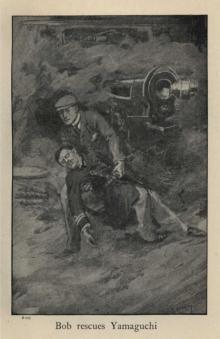 Kobo: A Story of the Russo-Japanese War
Kobo: A Story of the Russo-Japanese War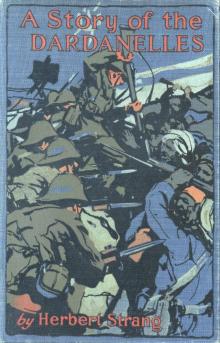 Frank Forester: A Story of the Dardanelles
Frank Forester: A Story of the Dardanelles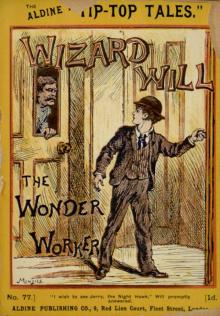 Wizard Will, the Wonder Worker
Wizard Will, the Wonder Worker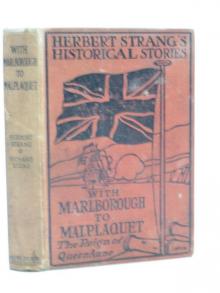 With Marlborough to Malplaquet: A Story of the Reign of Queen Anne
With Marlborough to Malplaquet: A Story of the Reign of Queen Anne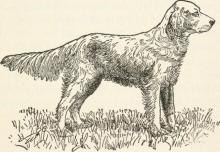 The Dogs of Boytown
The Dogs of Boytown Brown of Moukden: A Story of the Russo-Japanese War
Brown of Moukden: A Story of the Russo-Japanese War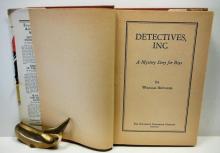 Detectives, Inc.: A Mystery Story for Boys
Detectives, Inc.: A Mystery Story for Boys Bright Ideas: A Record of Invention and Misinvention
Bright Ideas: A Record of Invention and Misinvention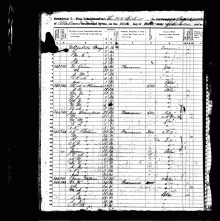 Lost in the Cañon
Lost in the Cañon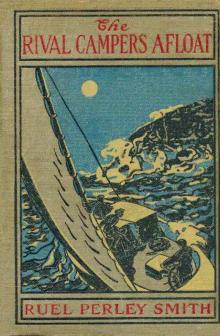 The Rival Campers Afloat; or, The Prize Yacht Viking
The Rival Campers Afloat; or, The Prize Yacht Viking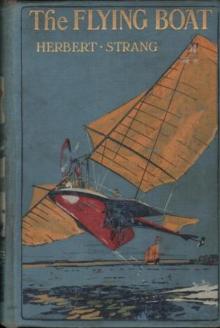 The Flying Boat: A Story of Adventure and Misadventure
The Flying Boat: A Story of Adventure and Misadventure The Flying Reporter
The Flying Reporter Jack Hardy: A Story of English Smugglers in the Days of Napoleon
Jack Hardy: A Story of English Smugglers in the Days of Napoleon No Man's Island
No Man's Island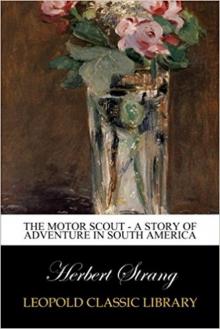 The Motor Scout: A Story of Adventure in South America
The Motor Scout: A Story of Adventure in South America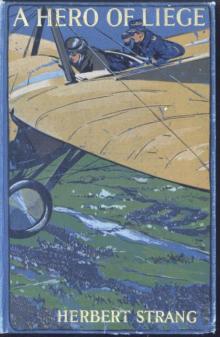 A Hero of Liége: A Story of the Great War
A Hero of Liége: A Story of the Great War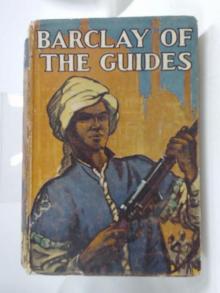 Barclay of the Guides
Barclay of the Guides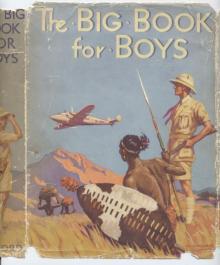 Carry On! A Story of the Fight for Bagdad
Carry On! A Story of the Fight for Bagdad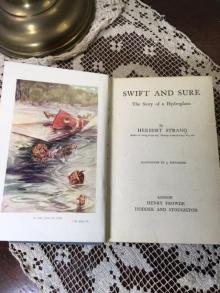 Swift and Sure: The Story of a Hydroplane
Swift and Sure: The Story of a Hydroplane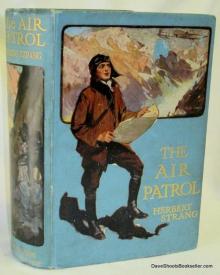 The Air Patrol: A Story of the North-west Frontier
The Air Patrol: A Story of the North-west Frontier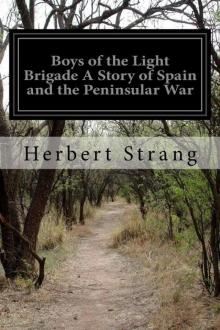 Boys of the Light Brigade: A Story of Spain and the Peninsular War
Boys of the Light Brigade: A Story of Spain and the Peninsular War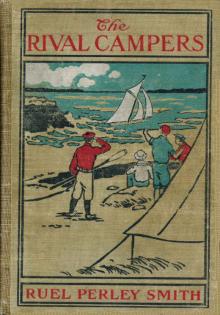 The Rival Campers; Or, The Adventures of Henry Burns
The Rival Campers; Or, The Adventures of Henry Burns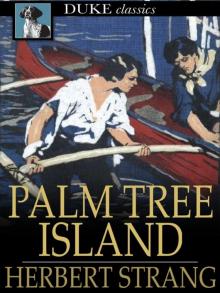 Palm Tree Island
Palm Tree Island The Friends; or, The Triumph of Innocence over False Charges
The Friends; or, The Triumph of Innocence over False Charges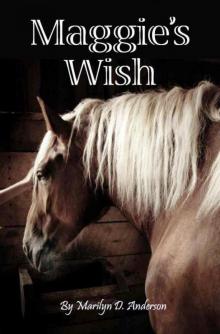 Maggie's Wish
Maggie's Wish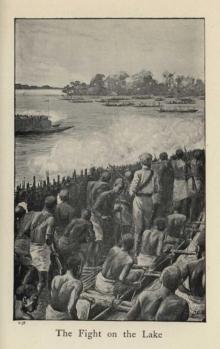 Tom Burnaby: A Story of Uganda and the Great Congo Forest
Tom Burnaby: A Story of Uganda and the Great Congo Forest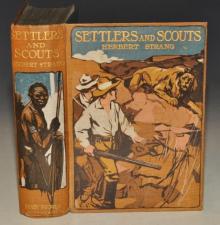 Settlers and Scouts: A Tale of the African Highlands
Settlers and Scouts: A Tale of the African Highlands In Clive's Command: A Story of the Fight for India
In Clive's Command: A Story of the Fight for India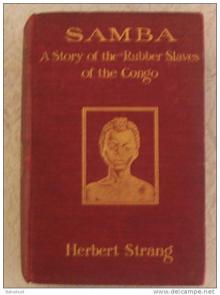 Samba: A Story of the Rubber Slaves of the Congo
Samba: A Story of the Rubber Slaves of the Congo The Auto Boys' Quest
The Auto Boys' Quest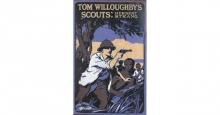 Tom Willoughby's Scouts: A Story of the War in German East Africa
Tom Willoughby's Scouts: A Story of the War in German East Africa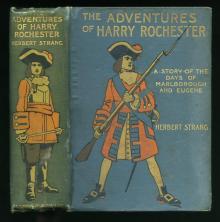 The Adventures of Harry Rochester: A Tale of the Days of Marlborough and Eugene
The Adventures of Harry Rochester: A Tale of the Days of Marlborough and Eugene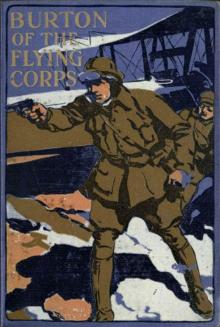 Fighting with French: A Tale of the New Army
Fighting with French: A Tale of the New Army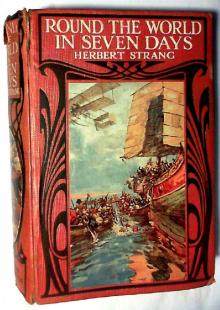 Round the World in Seven Days
Round the World in Seven Days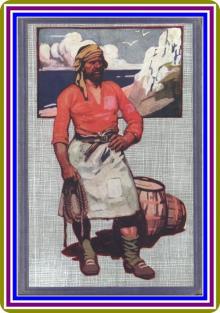 The Adventures of Dick Trevanion: A Story of Eighteen Hundred and Four
The Adventures of Dick Trevanion: A Story of Eighteen Hundred and Four